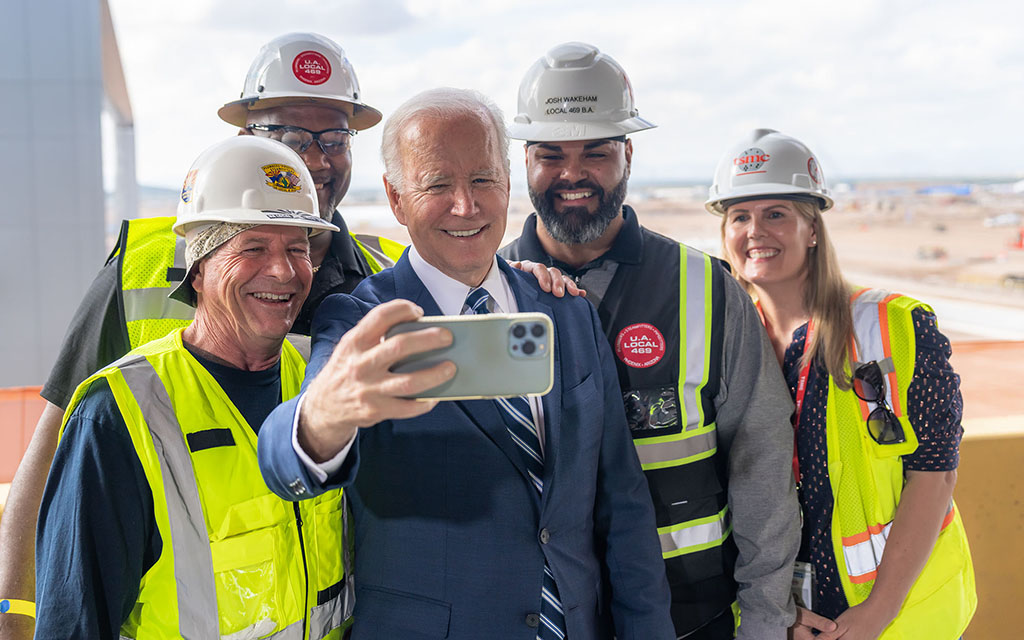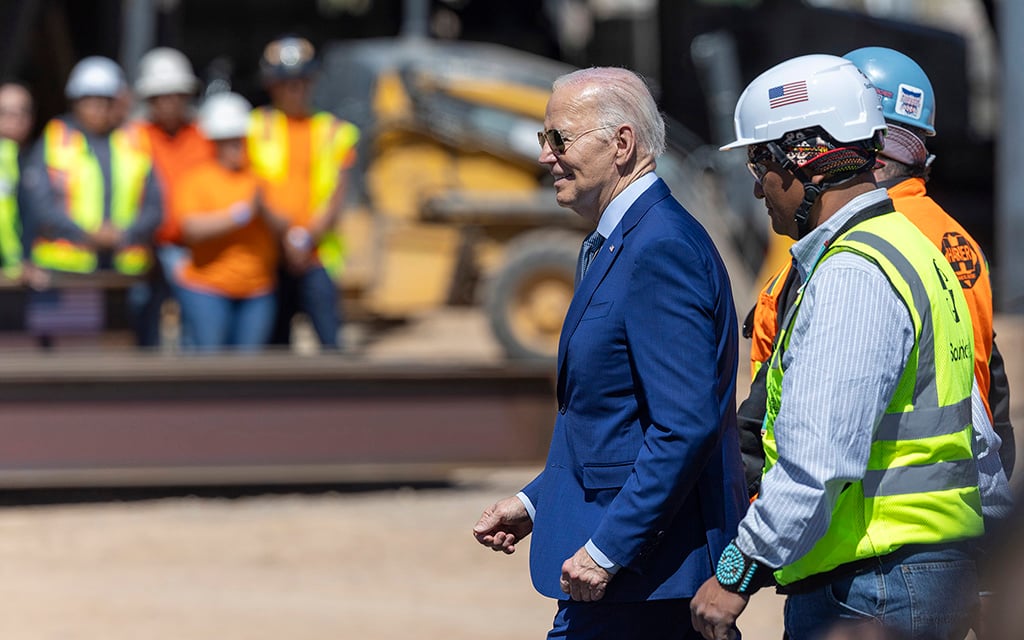PHOENIX – The Biden administration announced Monday that it will award $6.6 billion in grants and another $5 billion in loans to Taiwan Semiconductor Manufacturing Co. to enhance and expand semiconductor production in Arizona.
It’s the second time in three weeks that the White House has delivered CHIPS and Science Act funds to an Arizona chipmaker – Intel received $8.5 billion in grants and $11 billion in loans last month for its planned expansion in the state.
Federal and local officials hailed the support for TSMC, which is currently building two semiconductor plants in Phoenix and will now invest in a third, moves supporters say will help create thousands of jobs in the state.
With the expansion to a third plant, TSMC’s investment in Arizona manufacturing will grow to $65 billion, officials said. Phoenix Mayor Kate Gallego said in a prepared statement Monday that TSMC investments will create more than 25,000 construction and manufacturing jobs and thousands more “indirect” jobs.
Sen. Kyrsten Sinema, I-Arizona, and Sen. Mark Kelly, D-Arizona, in a prepared statement credited the federal investments to the CHIPS Act, which they said they helped get through the Senate in 2022, with Kelly securing nearly $52 billion in funding for domestic microchip manufacturing.
“Today’s TSMC investment – fueled by our bipartisan CHIPS and Science law – is making transformational investments in our state, creating strong Arizona careers, protecting our national security, and strengthening Arizona’s leadership in semiconductor manufacturing,” Sinema said in the statement.
Monday’s announcement came just weeks after President Joe Biden visited Arizona on March 20 to announce the Intel award – which will be used to construct two new manufacturing plants in the Valley. Besides expanding chip-making capacity, Intel plans to use the grants to produce more cutting-edge semiconductors, what one company official called “not just producing, you know, old stuff” but “producing the leading-edge semiconductor manufacturing in the United States.”
Kelly said the latest grant will also allow TSMC to produce “the most advanced microchips ever made in the United States … making Arizona the emerging global hub for microchip development, testing, manufacturing, and packaging.”
In a statement, Gov. Katie Hobbs said the expansions will allow Arizona to become an international leader in semiconductor manufacturing, calling the state the “silicon desert.”
“Some of the world’s most advanced chips will be made here in Arizona at TSMC, and this investment underscores our commitment to innovation and technological leadership,” Hobbs’ statement said.
As of May 2023, more than $60 billion had been invested in Arizona’s semiconductor industry, a combination of private and state funds.
But not everyone is celebrating.
A coalition of organizations known as the CHIPS Communities United has raised concerns over potential labor and environmental problems with investments in companies like Intel and TSMC. The group has called on both companies to pledge to follow responsible labor and environmental practices.

Construction at the Intel chip-making plant in Chandler, which last month received an $8.5 billion grant under the CHIPS and Science Act for its expansion. (File photo by Sam Ballesteros/Cronkite News)
“For these investments to truly succeed in reestablishing leading-edge semiconductor manufacturing in the U.S., we need enforceable commitments from TSMC on worker-centered workforce development and domestic recruitment that empowers workers, lifts labor and occupational safety standards, creates good union jobs, and promotes equity,” said Matt Biggs, president of the International Federation of Professional and Technical Employees, in a statement.
Ben Jealous, the executive director of the Sierra Club, expressed concerns about the projects’ impact on Arizona’s environment.
“Investing in bringing the clean-energy supply chain to the U.S. is critical to a clean-energy future,” Jealous said in a statement. “President Biden’s CHIPS law is making this future possible, starting with providing $6 billion to TSMC to make semiconductors in Arizona. But to fulfill the opportunity it now has, TSMC must commit to sustainability and public health.”
But most Arizona lawmakers were focused on the economic gains they said will come from the latest round of grants and loans.
“Over the past decade, the efforts to install the Taiwan Semiconductor Manufacturing Company (TSMC) in the Arizona desert have resulted in tremendous progress as this dream nears its reality,” Rep. Debbie Lesko, R-Peoria, said in a statement.
“I am proud of the partnership of all involved with this project, and I am excited to see the economic boom this new manufacturing is certain to create in the northwest valley,” she said. “This union between Arizona and TSMC will lead to a brighter future for our state and nation!”


